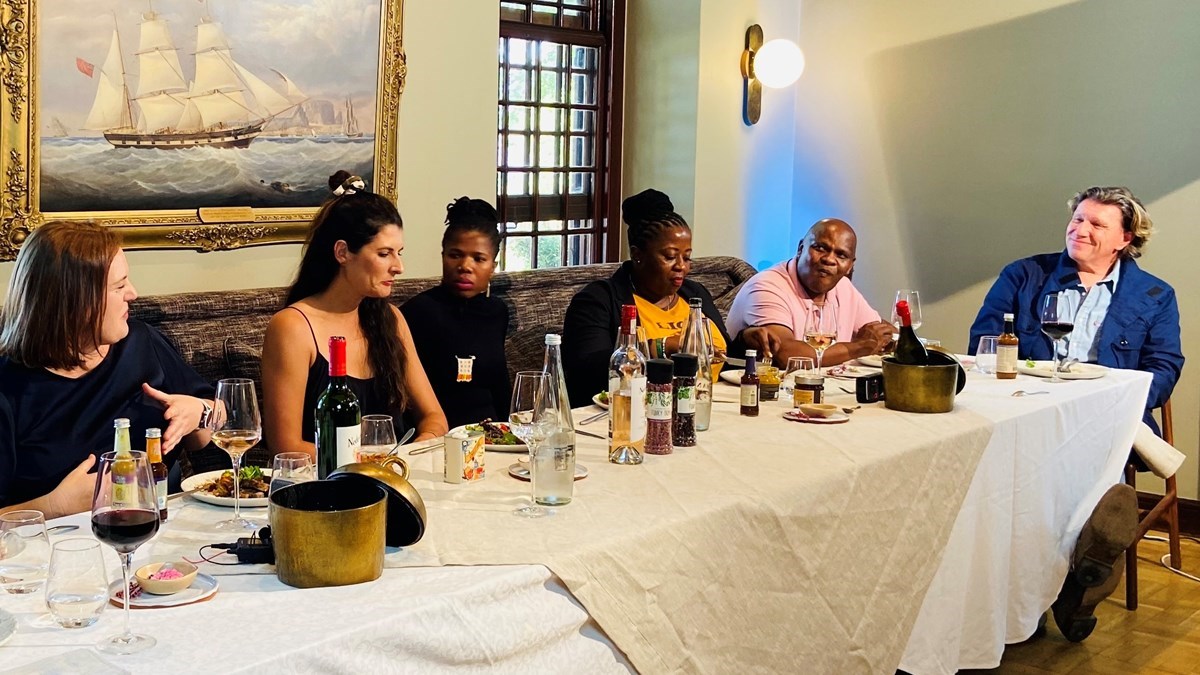The World Fair Trade Organization (WFTO) - Africa and Middle East chapter through its Domestic Fair Trade project is actively working at encouraging consumers to become more sustainable in their purchasing choices. The Sustainable Choices in the Kitchen hosted at the Manor, Nederburg brought together a few sustainable brands local to Drakenstein Municipality to discuss how brands are making sustainable choices in the kitchen easier to access. Participating brands included Nederburg Wines, Turqle Trading, Funky Ouma, Kapula Candles and Linen Drawer. Local stakeholders who actively contribute to promoting sustainable lifestyles included Charleston Hill Primary School, Wine.co.za, Drakenstein Municipality and a local nutritionist.
Andie Steele-Smith, Chairman of wine.co.za and social entrepreneur says: “The WFTO Sustainable Kitchens initiative is an important one. It is helping to bring the often disparate narratives of social and economic transformation, restoration of dignity and hope, a living wage, best business practices, empowerment of micro-entrepreneurs; the needs of larger businesses - and individual householder responsibility onto the one page.
Transformation has to permeate all elements of society, of culture, of education and of local and international commerce, for it to be both real and sustainable. This initiative is contributing powerfully to the continued transformation of South Africa by mobilizing many local businesses, thought leaders and individual consumers to collectively make a difference.” Wilfred Frolicks, Vice Principal at Charleston Hill primary school says: “What a vibrant, wonderful and educative experience this was. We are proud to be a part of such an important and valuable initiative.
We look forward to future endeavours with World Fair Trade Organization.” Musa Mpofu, Project Officer of the Domestic Fair Trade Organization says: “It is the responsibility of each consumer to contribute towards educating the next person on how we all can be more sustainable in our purchasing choices. We need to take the ‘each one teach one’ approach. If we all realize that we are the living custodians of the environment and that our choices affect the growth of our local economy, then we are more likely to gravitate to more sustainable choices.”

Left to right: Kate Jackson, Johannita Eksteen, Bongekile Mabaso, Thembisile Mnisi, Wilfred Frolicks, Andie Steele-Smith.
About World Fair Trade Organization - Africa and Middle East
Fair Trade is a trading partnership, based on dialogue, transparency and respect, that seeks greater equity in international trade. It contributes to sustainable development by offering better trading conditions to, and securing the rights of, marginalized producers and workers, especially in the global South.
World Fair Trade Organization Africa and the Middle East (WFTO Africa & ME) is a non-profit network of Fair Trade producers in Africa and the Middle East, whose ongoing commitment to Fair Trade is monitored and verified under the WFTO Guaranteed Systems (GS). WFTO Africa & ME brings together over 80 WFTO members – entrepreneurs, artisans, cooperatives, farmers and support organizations – across over 20 countries in the region that are fully committed to Fair Trade. WFTO together with all the Regional Chapters has a single membership process that requires organizations interested in becoming members of this global Fair Trade network to be able to demonstrate compliance with WFTO Fair Trade Standard. The standard looks at every aspect of a business and confirms whether it is truly a Fair Trade Enterprise. Guaranteed WFTO members use the WFTO label to tell consumers, customers and their communities about their identity as a verified Fair Trade enterprise.
Fair Trade is more than just trading: It proves that greater justice in world trade is possible; It highlights the need for change in the rules and practice of conventional trade and shows how a successful business can also put people first and; It is a tangible contribution to the fight against poverty, climate change and economic crisis.
Where to find participants:
- Nutritionist (Bongekile Mabaso)
vukazimele.mabaso@gmail.com Twitter: @bongi_mabaso, Facebook: Bongi Mabaso
- Charleston Hill Primary School (Wilfred Frolicks)
charlestonhillprimary@gmail.com
021 862 0440
- Drakenstein Municipality (Thembisile Mnisi)
Thembisile.Mnisi@drakenstein.gov.za www.drakenstein.gov.za,
+27 21 807 7790/+27 81 017 8981
- Funky Ouma (Johannita Eksteen)
jo@funky-ouma.co.za www.funky-ouma.co.za,
+27 79 123 7087
Facebook - https://www.facebook.com/FunkyOuma/, Instagram - https://www.instagram.com/funky_ouma/
- Kapula Candles (Darren Nesbitt)
darrennesbitt@kapula.com www.kapula.com
+27 (0)28 425 1969
Facebook - @KapulaSouthAfrica
- Linen Drawer (Jimmy Ferendinos)
Jimmy@linendrawer.co.za www.linendrawer.co.za
+27 872 0108/ +27 82 771 4081
- Nederburg Wines (Kate Jackson)
kjackson@distell.co.za www.nederburg.com
Facebook: Nederburg Wines, Twitter: @nederburg, Instagram: nederburgwine Youtube:
Nederburg
- Turqle Trading (Sarah Withey)
sarah@turqle.com www.turqle.com www.turqle.co.za
Facebook – turqlebrands, Instagram – turqletrading, Twitter – TurqleTrading
- wine.co.za (Andie Steele-Smith) andie@wine.co.za www.wine.co.za
- World Fair Trade Organization – Africa and Middle East (Musa Mpofu)
domesticftsa@wfto-africa.org www.wfto-africa.org
Facebook - @wfto.africa.org, Twitter -@WftoE, Instagram – wfto.Africa, YouTube – World Fair Trade Organization Africa and Middle East